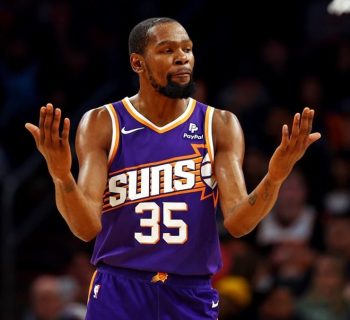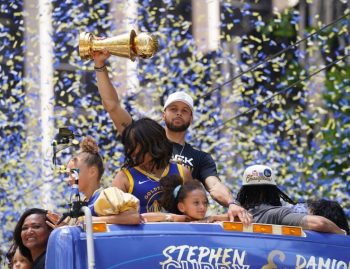NBA
NBA PM: Utah Has Some Hope Against Heavily Favored Warriors

On May 2, 2017, the Golden State Warriors will host the Utah Jazz for Game 1 of the Western Conference Semifinals. The Jazz come into the match up after closing out the Los Angeles Clippers in a commanding Game 7 victory on the road at Staples Center. In contrast, the Warriors long ago finished a sweep of the Portland Trail Blazers on April 24.
In all time head-to-head match ups, the Jazz have won 104 of 177 total regular season games. Consider this to be the only place where the Jazz can claim just about any sort of edge between the two franchises. In the playoffs, the Warriors have won two of the three series match ups. The last time two franchises met, they also played in the Western Conference Semifinals in 2007. In that match up, the Jazz defeated the Warriors in five games and took down the “We Believe” Warriors, who had just upset the first-seeded Dallas Mavericks. In a quest to avenge the past as the team marches forward, the Warriors will be hosting many players from the “We Believe” team and honoring their historic upset of the Mavericks (before being eliminated by the Jazz).
Ten years later the two teams meet again and this time, the Jazz are the severe underdogs. In fact, the odds are out from Vegas and they are astonishingly bad for the Jazz. Notably, the Warriors come into this series after winning each of their regular season games against the Jazz by an average of 18 points.
Of all playoff teams so far, the Warriors have the league’s lowest turnover percentage, the highest true shooting percentage, the second-highest team assist percentage and are third in offensive rating. In addition, the Warriors currently sport a dominating plus/minus of 18 in four playoff games. The team does a great job of executing their sets, moving the ball without turning it over and scoring a lot of points efficiently. Simply put, they win and they win by a lot.
Based on plus/minus, the Warriors possess the top three two-man lineups — including combinations of Stephen Curry, Klay Thompson and Draymond Green — the top-two three-man lineups if you add in in Zaza Pachulia and the top five four-man lineups when you add in Kevin Durant to the mix. The starting five for the Warriors, in almost any combination, has been unstoppable.
Although the majority of the Warriors’ best players are perimeter players, the team as a whole does a great job of getting to the rim and scoring. In the playoffs, they shoot 30 shots a game at the rim (five feet or less, and ranked 2nd among teams still in the playoffs) and are shooting 60.8 percent (tied for 4th) on those shots. That is in addition to their hot shooting on perimeter shots (3rd place on shots from 20-24 feet and from 25-29 feet). The Warriors score all over the floor, which includes getting to the rim at a high rate. That puts a lot of pressure on opposing defenses, which Portland experienced firsthand in the first round.
After only needing four games to dispatch the Trail Blazers, the Warriors come into this series well rested and presumably well prepared. They are hungry to avenge their stunning Finals collapse last season and are ready to quickly dispatch any team on their way to a presumed rematch with the Cleveland Cavaliers for a historic third Finals match up in a row.
It’s clear that the Jazz are not only the underdog in this series, but are over-matched talent wise and face astonishingly bad odds in this series. So what can the Jazz do to maximize their odds? Follow Head Coach Quin Snyder’s game plan and execute their offense at their usual methodical pace. As stated above, the Warriors haven’t played since April 24. If the long layoff causes the Warriors to have a slow start to Game 1, perhaps the Jazz can take advantage and jump out to an early lead.
In the regular season, the Jazz played at the league’s slowest pace and the Warriors played at the fourth fastest pace. In the playoffs, of the teams remaining, only the San Antonio Spurs play at a slower pace than Utah so far, while the Warriors play at the fastest pace. In sum, there is a huge contrast in style between these teams. The Warriors want to run up and down the floor and if given the chance will blow a game wide open and look to run up the score, while the Jazz will try to muck up the game with defensive pressure.
In the regular season, the Jazz posted the league’s third-best defensive rating, just behind the Warriors and Spurs, which helped make them a sleeper choice for playoff success. While the Warriors have maintained their overall excellence (first among all playoff teams) with a net rating of 18.3, the Jazz have fallen off their pace (seventh of all playoff teams) with a net rating of 1.8.
Even if the Jazz can execute on offense and slow the game down, they will need to return to the high level of defensive excellence that marked their regular season play. However, part of that formula may be out of their control. The Jazz were able to rely on a healthy Defensive Player of the Year candidate in Rudy Gobert in 81 of 82 regular season games. Although he has since returned from a hyper-extended knee in Game 1, Gobert has continued to look less than 100 percent with his scoring, rebounding and mobility at least slightly compromised. If Gobert can play up to his regular season level, look for the Jazz to attempt to play one-on-one defense on the perimeter, stay home on shooters and allow Gobert to protect any penetration at the rim. The Jazz have a roster especially built for this as they have a plethora of capable wing depth. This will allow Utah to disrupt passing lanes, force Golden State into contested jumpers and could lead to easy baskets in transition.
Although the Jazz have seemed to settle on a strategy where Gobert and Derrick Favors mostly alternate at center, Gobert getting into foul trouble in Game 7 allowed Favors to shine as he pulled down 11 rebounds and scored 17 points on 8-11 shooting. If either of these players can be especially effective down low, look for Defensive Player of the Year candidate Draymond Green to shift down low to help contain. Warriors’ centers Pachulia and Javale McGee can be effective but less dominant on defense. Having Green focused on the interior can prevent his devastating roving abilities, help defense, which can wreak havoc on opposing offenses, and will keep him from hounding Utah’s perimeter scorers.
Other bright spots for Utah include forward Gordon Hayward’s play. If you remove the food poisoning game, Hayward has averaged 28 points, eight rebounds and four assists on 48 percent shooting from the field, 46 percent from three and 96 percent shooting from the free throw line. The strong play from the first time All-Star has been supplemented by the well-documented clutch performance from veteran Joe Johnson, who absolutely crushed the Clippers playoff hopes in multiple games. As a team, the Jazz have faced many close game situations already this postseason, whereas the Warriors haven’t played in any high-pressures games since the regular season.
What else can possibly hinder the Warriors? The team has yet to announce when head coach Steve Kerr might return. His ongoing back issues continue to hang over the franchise. Kerr has had to remove himself from coaching in the playoffs so far due to the reoccurrence of severe back pain related to complications from his back surgery and there has even been speculation that his ongoing condition could force him to retire. There have been no issues yet but perhaps the substitution of assistant coach Mike Brown might eventually disrupt some of the Warrior’s usual tendencies and dominant flow. At least former fill-in assistant coach Luke Walton had half a season to step into Kerr’s shoes. Contrast this uncertain coaching situation with the strong coaching performance of head coach Quin Snyder, who did an admirable job of adjusting and readjusting to all of the Clippers’ moves in the opening series.
Additionally, though he has returned to action and has played well, there is still some trepidation as to how forward Kevin Durant will hold up throughout the playoffs after returning from a February 28 knee injury. A subsequent calf strain limited Durant to 20 minutes in the Game 4 close out against the Trail Blazers. Although it hasn’t been an issue yet, the Warriors are under pressure to not only win a championship this season but to do so convincingly. If any of the above factors come into play, perhaps a bit of that pressure negatively affects their play.
In sum, the Warriors will most likely win this series and do so in dominating fashion. However, if some combination of potential issues listed above come into play, perhaps the Jazz have a chance, however slim, to make this a competitive series and possibly shock the world.













